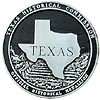From pack trails and wagon roads that marked this area at least 300 years, have developed such modern roads as U.S. Highway 181. The old trails of Indians, wild cattle and mustang horses formed highways for 17th, 18th and 19th century expeditions coming from Mexico to claim sovereignty for Spain over land of Texas. When pioneers established land grants in this section, they also found Indian trails useful, placing towns along them. Beeville, the county seat, was situated at the natural intersection of San Patricio-Helena Road with Goliad-Laredo Road. About 20 miles south, the Matamoros-Goliad road (Camino Real to old-timbers) was probably the most historic road in this area. In the years 1861-1865 the cotton road--called lifeline of the southern Confederacy--crossed Bee County. A later route of great value was a cattle trail that channeled thousands of Longhorns from the Rio Grande to the Red River and up the Dodge City Trail or the Chisholm Trail to northern markets. In this area were also La Para (or Grapevine) Road; the Indianola-Papalote Road; and a road to now vanished St. Mary's, a port on Copano Bay, off the Gulf of Mexico. (1968)
This page last updated: 7/15/2008 |
Early Trails Historical Marker Location Map, Bee County Historical Marker Location Map, Texas
|
|
Related Themes: Texas C.S.A., Texas Confederate States of America, Confederacy
Explore other
Texas Confederate Historical Markers.
|


